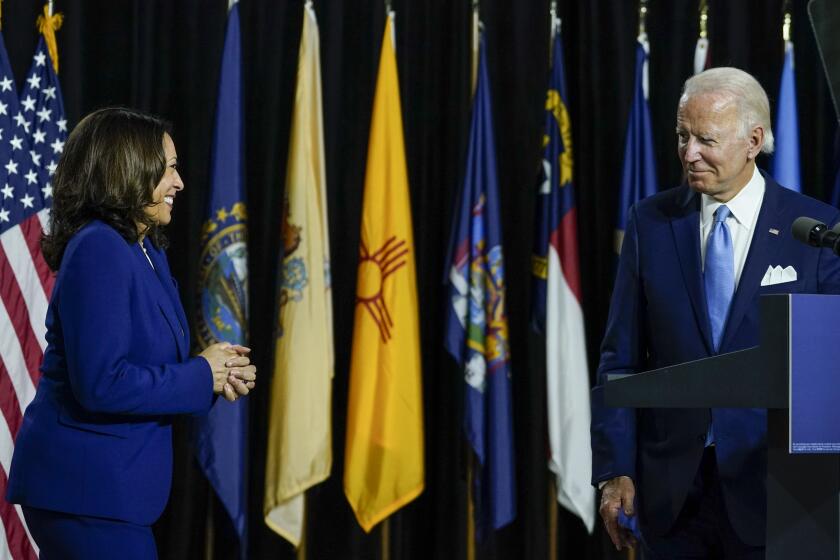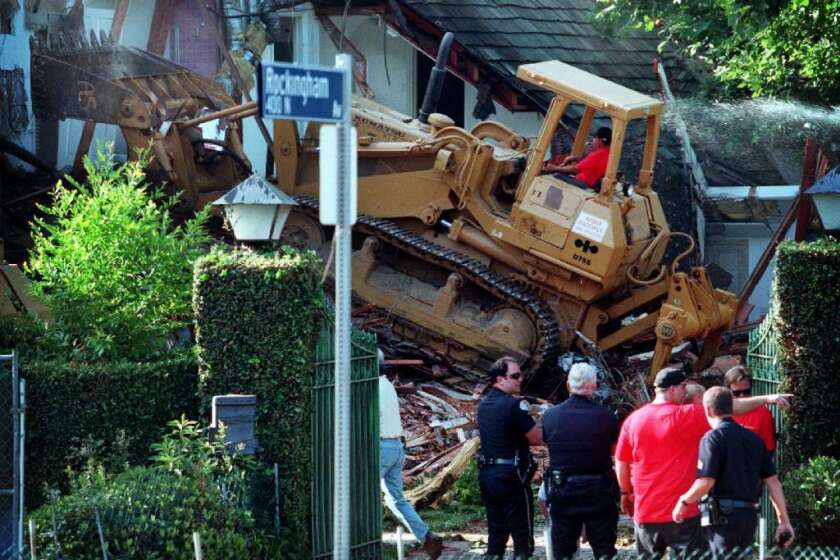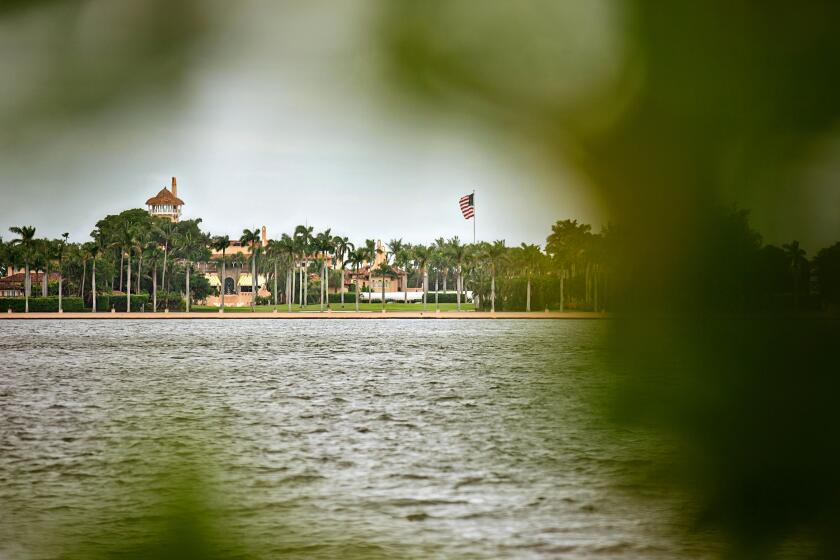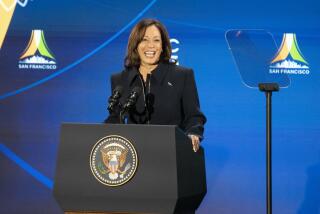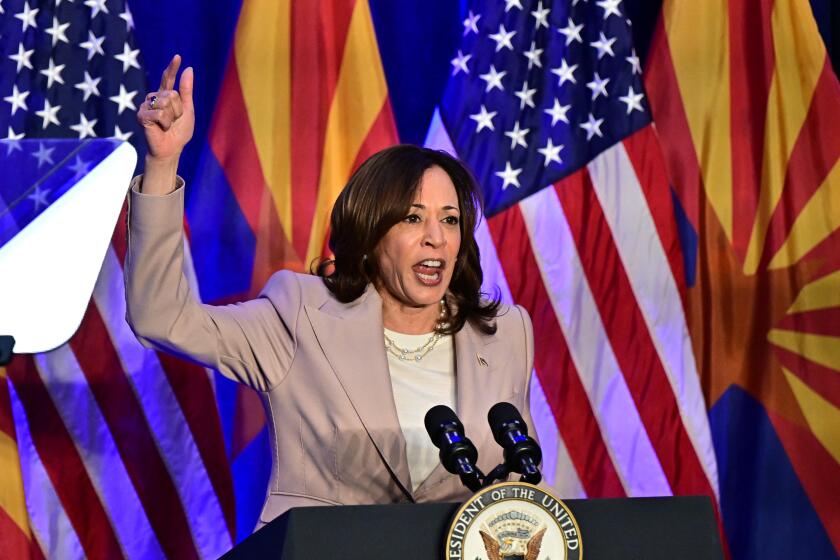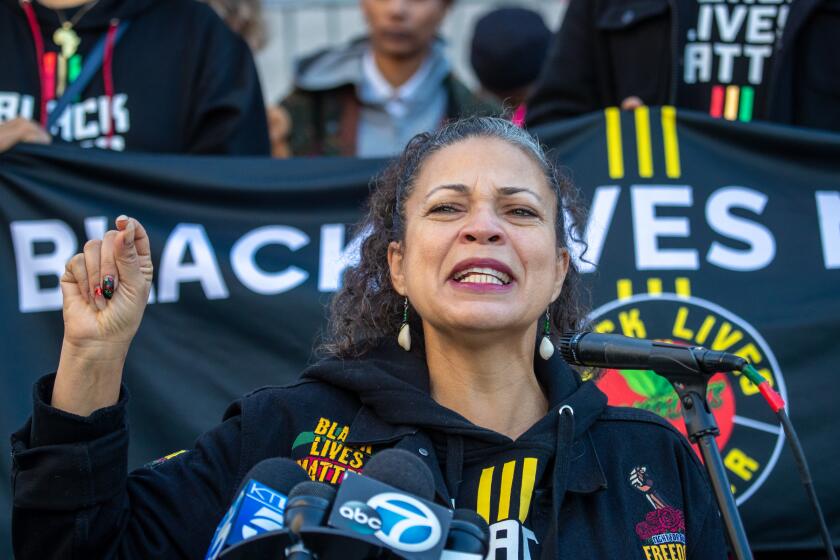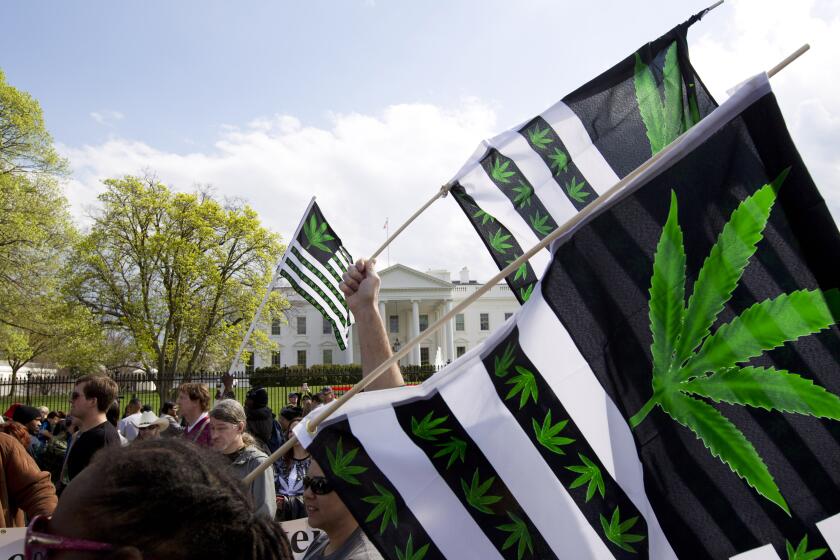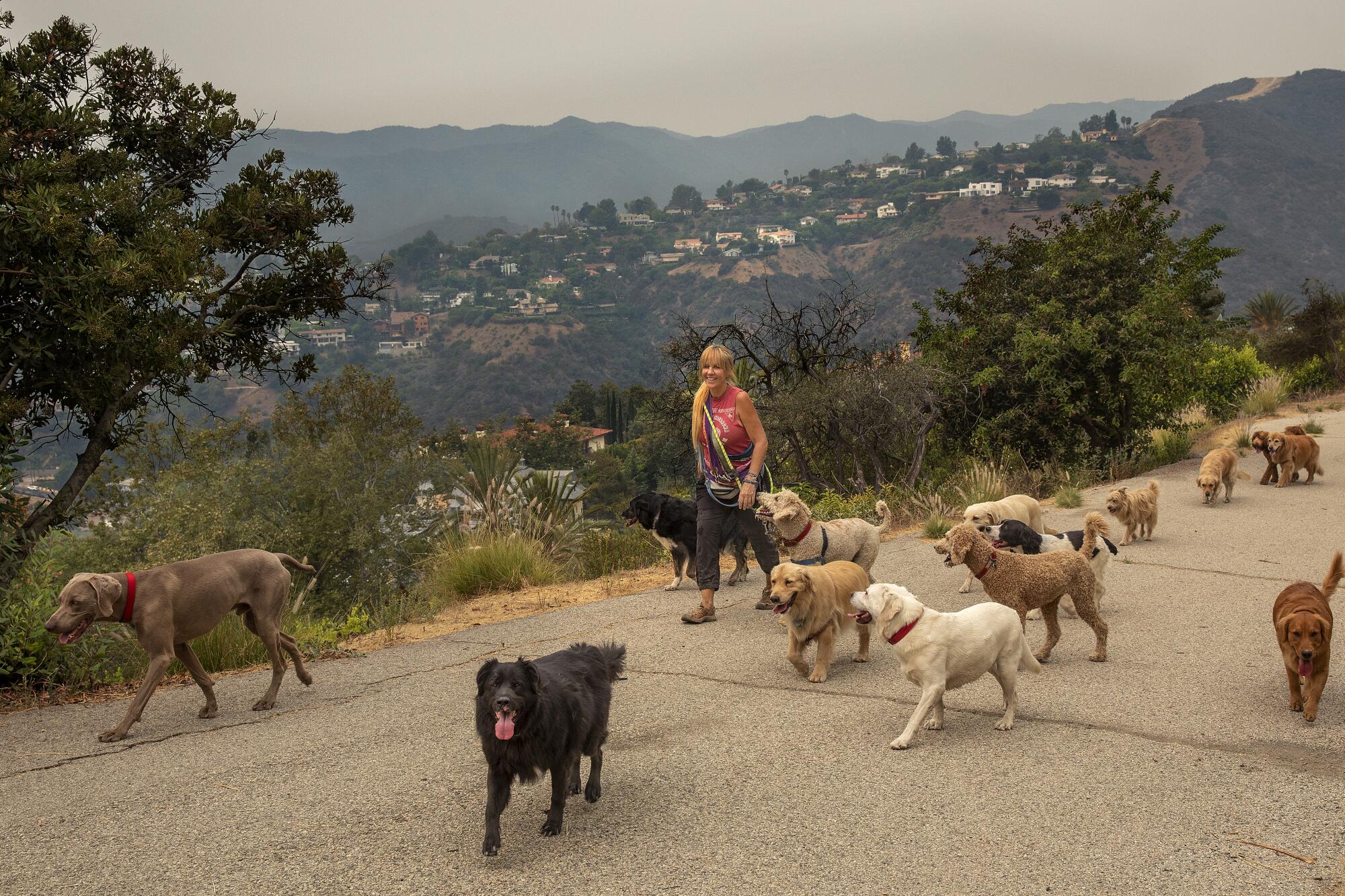
The constellation of neighborhoods and smaller cities that constitute what Americans think of as L.A. brings to mind lots of competing reference points: towering palms and glistening lowriders. Botox clinics and tattoo parlors. Tofu and tacos, “Gin and Juice.” Earthquakes and uprisings.
What isn’t necessarily seared into the imagination is Brentwood, an exclusive neighborhood in West Los Angeles where Democratic vice presidential candidate Kamala Harris lives.
But this once low-key island of privilege isn’t as isolated as it used to be. In the year and a half since Harris launched a bid for her party’s presidential nomination, the problems of the country she wants to help lead — poverty, racial inequities, climate change, civil discord — have inched closer to her doorstep.
In Brentwood, the who’s who of entertainment, business and politics live along streets that reach up into the steep hills that line the northern fringe of the city. Many of the houses look more like palaces. Lawns sprawl out like botanical gardens. People identify themselves according to the canyon they live in.
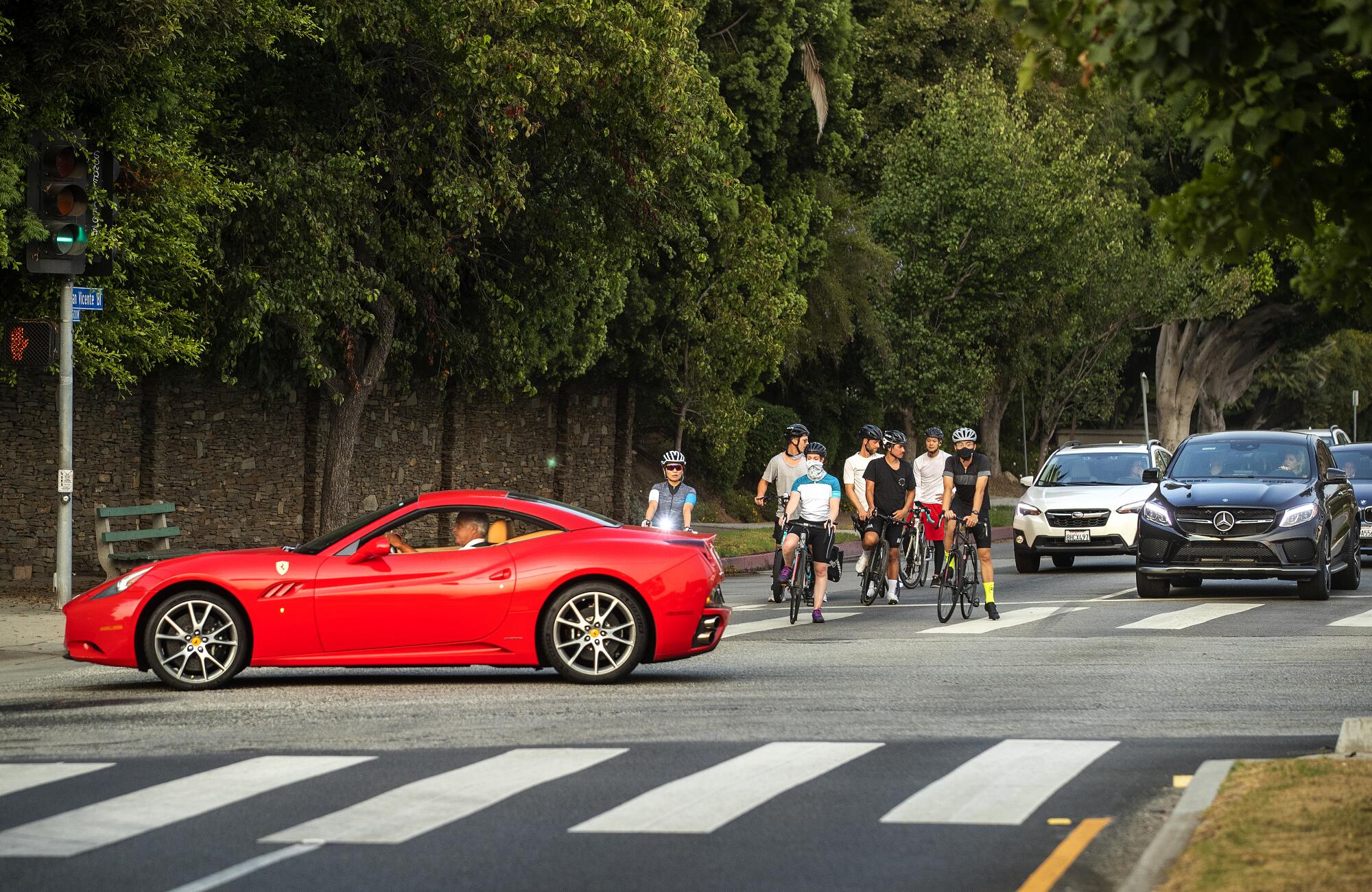
“Even though L.A. is sort of this huge, wide-open metropolis, Brentwood is kind of in its own pocket,” said Aaron Sandler, a producer on the TV game show “Let’s Make a Deal” who grew up in neighboring Santa Monica, attended Brentwood School and now lives in the area. As he walked his dog on a fire road high above Brentwood, Sandler gazed out over a sliver of the Pacific beyond a procession of barren ridges — a breathtaking vision of emptiness in crowded L.A.
Harris, the junior U.S. senator from California, has been able to live under the radar here in a $5-million house she shares with her entertainment attorney husband, Doug Emhoff, in Kenter Canyon.
About this series
Even in a pandemic, candidates spend much of their time campaigning in one town after another. But what is the America they’ve seen from their own front doorstep? In this series, Times reporters explore the communities the candidates have called home.
She speaks with affection about growing up the child of an Indian mother and Jamaican father in the Bay Area, and about joining Alpha Kappa Alpha, a Black sorority, while enrolled at Howard University in Washington, D.C.
By comparison, L.A. feels like a blank space on the map of her life. Harris rarely brings it up during campaign appearances. Her presence comes as a revelation to many fellow Brentwood residents.
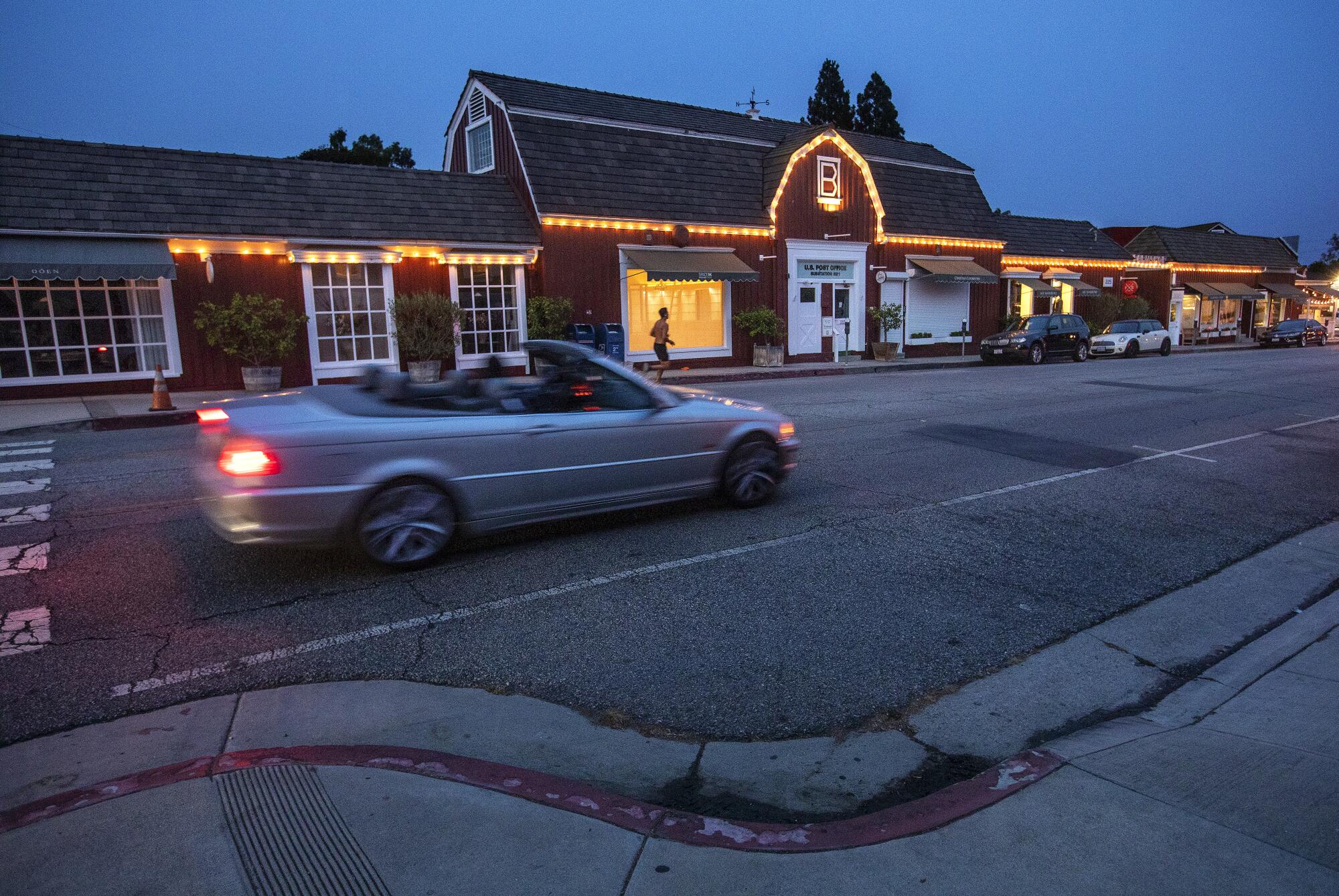
While out for a walk on a street lined with cliff-hugging houses and mansions hidden by hedges, Teri Wells and Zoe Green broke into giddy laughter when told Harris lives nearby.
“Wow, she does?” said Wells, a retired 61-year-old who lives “two canyons over” from Harris. “You don’t really think of her as being ‘L.A.’ It doesn’t fit her.”
In a way, though, Harris fits right in among the people of Los Angeles, a remarkably diverse metropolis of 12.4 million that’s full of contradictions.
With P.V. Gopalan, an upright civil servant and doting patriarch, Kamala Harris forged one of the defining relationships of her life.
To live along this stretch of Sunset Boulevard, between the tourist shops of Hollywood to the east and the beaches of Santa Monica to the west, means sharing the roads with the likes of Arnold Schwarzenegger, Gwyneth Paltrow, Jim Carrey, Reese Witherspoon and Dr. Dre, all of whom own multimillion-dollar homes in the neighborhood.
And perhaps sending your children to the same private secondary school where Hollywood producer and current Treasury Secretary Steven T. Mnuchin sends his — that is, if you can afford a yearly tuition that starts around $40,000.
But it also means reconciling the area’s immense wealth with a harsher reality.
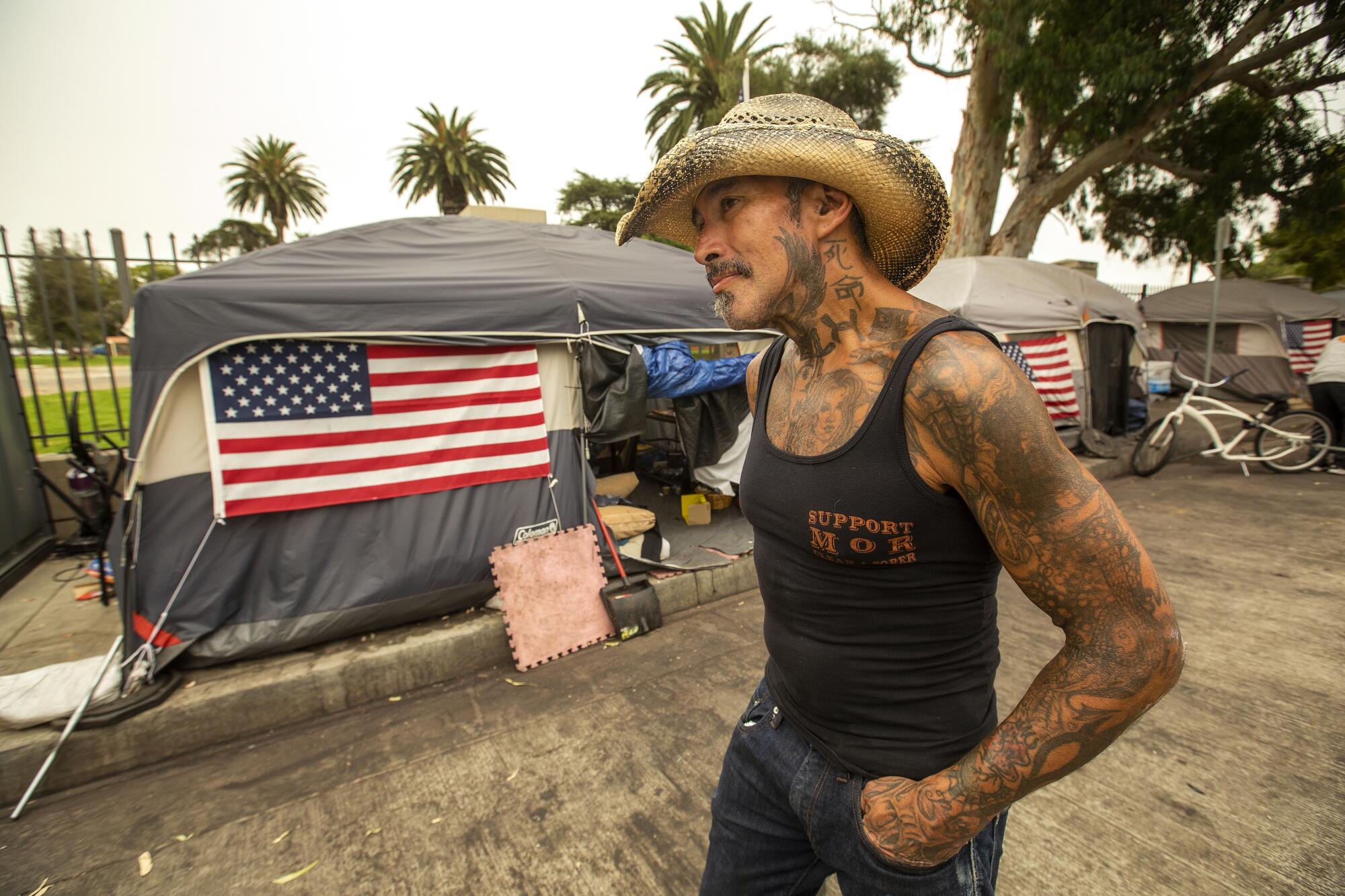
Tents with American flags hanging on them and a homeless encampment situated on the grounds of the West L.A. veterans hospital sit within jarring proximity to some of the most coveted real estate in the country — at the base of a hill where the Getty Center’s travertine surfaces glow in the sun.
The protests that spread citywide after the police killings of George Floyd and Breonna Taylor have left their mark, too.
One of the most striking faces on the streets of Brentwood today, for all its celebrity, is a portrait of the Afro-wearing Black activist Angela Davis on a strip of offices that were boarded up to prevent damage amid marches and standoffs between anti-racism demonstrators and authorities. Lakers star and NBA champion LeBron James, who calls Brentwood home, is one of the city’s most vocal celebrity advocates for Black Lives Matter.
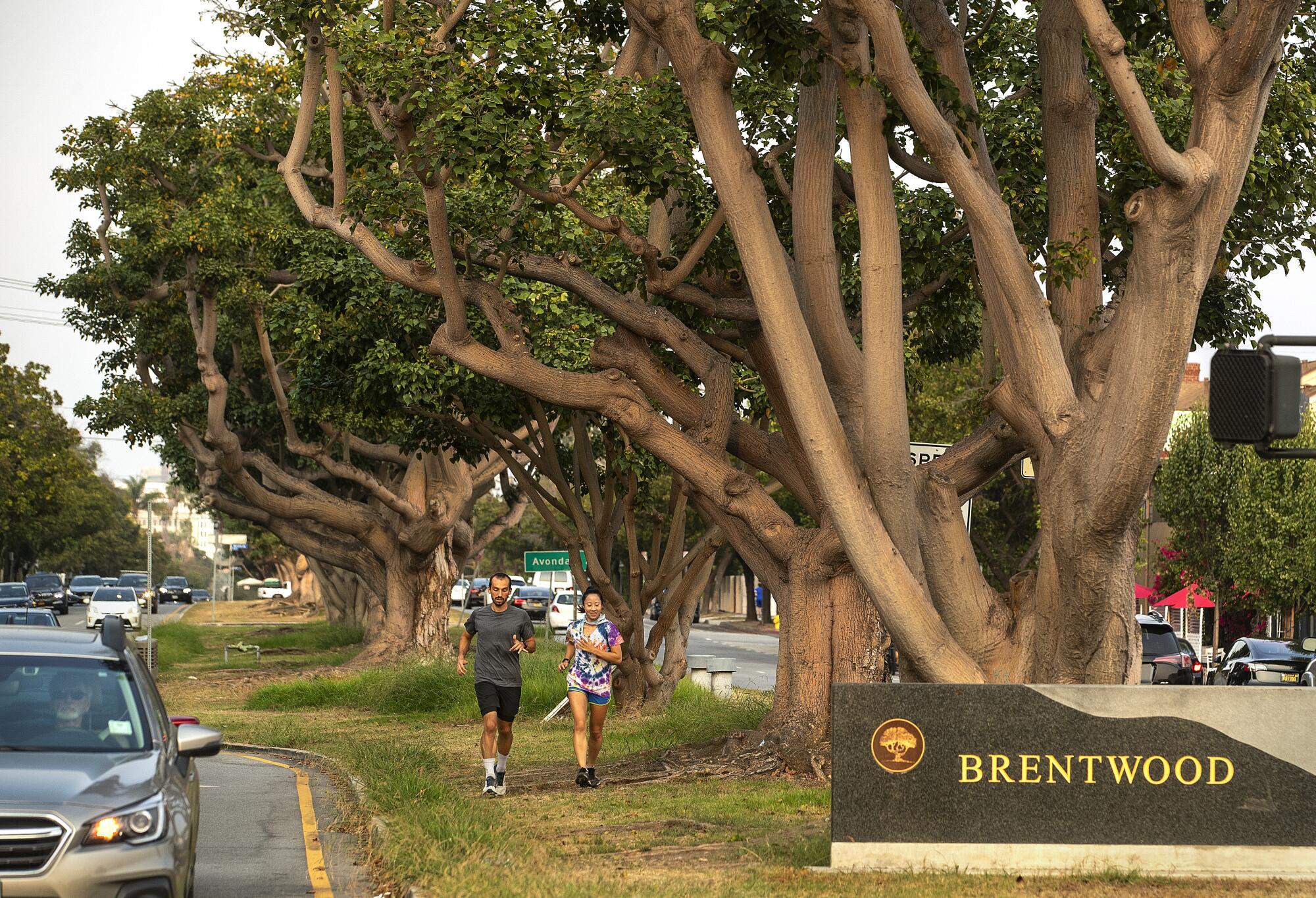
The reality of living in this enclave often clashes with its image in other ways.
The neighborhood was built in the early 20th century as one of L.A.’s first bedroom communities, a mixed-income but mainly middle-class district offering tranquility along leafy, gently curving streets only steps from the rugged wilderness. Lower-priced condos and apartments still exist, but that original vision is a thing of the past. The median home price in Brentwood now exceeds $2.8 million, according to Zillow, compared with the citywide median of $765,000.
That can make the class and racial divides on the streets of Brentwood especially glaring. Mostly Latino housekeepers, landscapers, construction workers, dog walkers, nannies, restaurant workers and ranch hands file in each day to attend to the needs of a neighborhood that is 85% white, compared with L.A. County, which is 72% people of color.
Taking a break from eating his salad in the courtyard of the Brentwood Country Mart — a complex of red barn-like buildings filled with eateries, boutiques and open-air patios that’s known for celebrity sightings — Otis Weis said the protests against racism and police brutality in Black communities have made locals more understanding of the injustices faced by people of color and those who are less affluent.
Joe Biden’s choice of Kamala Harris, a Howard University alum, is cause for celebration at HBCUs.
“I think people here are now more conscious of not exploiting their white privilege, because they may have a spotlight put on them … which is good,” said the white 28-year-old, who grew up in the area. He had no idea Harris lives here.
Fran Goodman described Brentwood as a “beautiful, tucked-away” section of the city in 1961 when she moved here to attend nearby UCLA.
She and her husband had to evacuate from their home during that year’s devastating Bel-Air fire, which jumped across the newly constructed 405 Freeway and raged through Brentwood.
As Goodman made her way down the street on foot, she said, she was surprised to see Richard Nixon standing on his rooftop hosing down the shingles. The former vice president who’d just left office had been renting the house to work on his memoir.
Another local, Ronald Reagan, was known to shut down Sunset Boulevard traffic when his presidential motorcade came through.
“He was always friendly, sticking his head out and waving at everybody,” Goodman recalled.
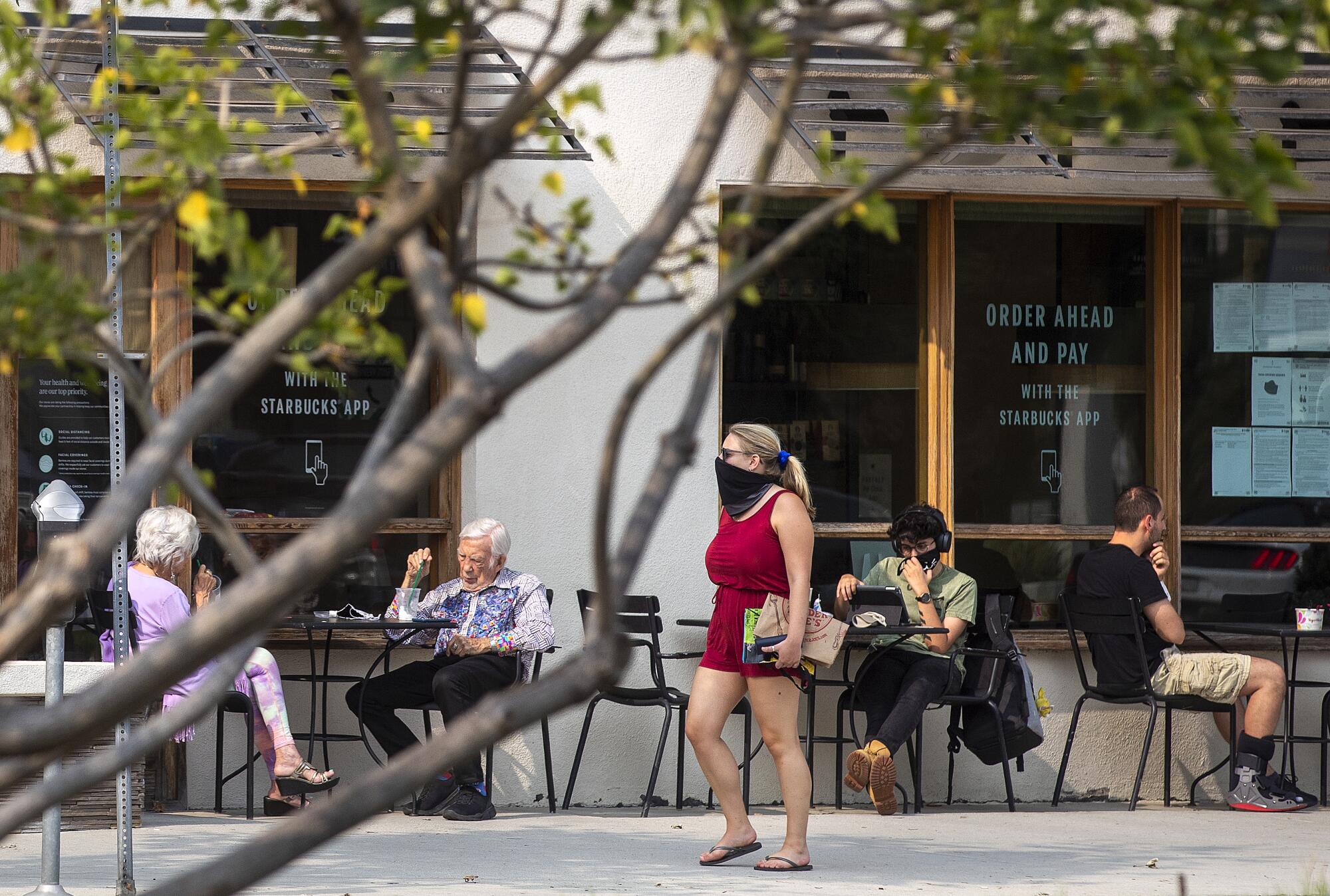
Goodman, 80, doesn’t make a fuss about the famous neighbors she’s had over the years, or about the fact that Harris lives near her now.
“Listen, Richard Nixon lived here and Mr. Reagan lived down the street on Capri,” Goodman said. “So how do I feel about celebrities or a vice presidential candidate living here? I’m OK with it.”
Like Goodman all those years ago, both James and Harris were among the thousands placed under evacuation orders last year as 50-mph winds sent the Getty fire skipping over ridge tops, scorching hillsides and destroying more than a dozen houses.
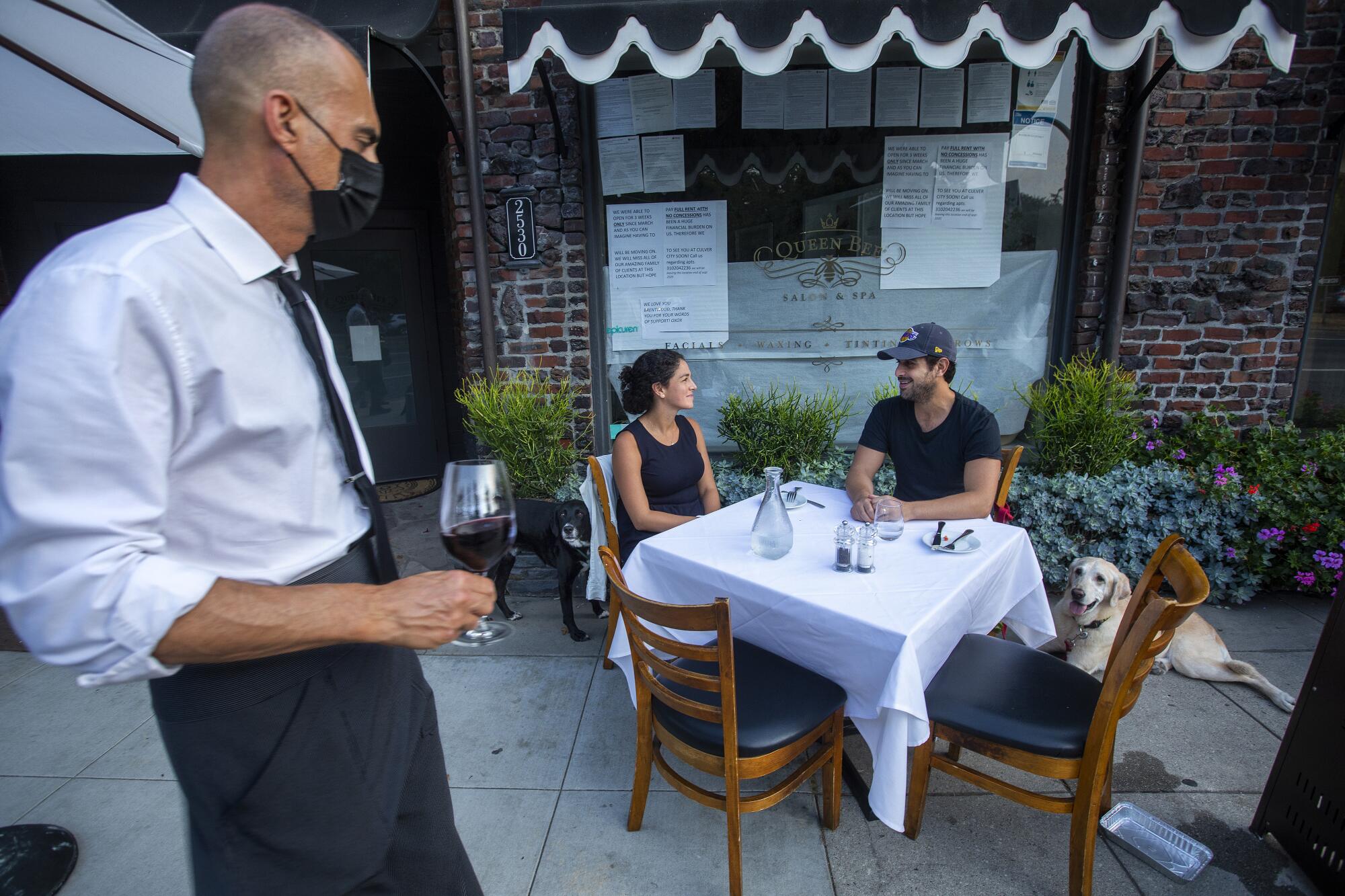
Locals go back and forth over whether their community has sacrificed the qualities that originally drew people here.
On the private Facebook group “I miss the old Brentwood,” one resident wrote that the neighborhood was once “our own little Mayberry quietly sandwiched between Beverly Hills and Santa Monica that no one paid attention to,” where “everyone knew everyone else.”
But Brentwood hasn’t lost all of its charms, locals say. Wells and her friend Green spoke of coyotes howling in the brush, owls hooting at night and neighborhood residents who aren’t fixated on appearances.
“You get to have this great, rustic feel, yet you’re less than a few miles into town,” Wells said.
“In Beverly Hills, you can’t walk out to your mailbox in your PJs,” added Green, a retiree who’s lived here for more than 30 years. “Well, here you can. It used to be hippie-ville.”
Still, many residents sense a shift happening as the neighborhood, known for allowing people to hide in plain sight, becomes yet another locale where those who crave the limelight can see and be seen.
“In Beverly Hills you can’t walk out to your mailbox in your pjs,” added Green, a retiree who’s lived here for more than years. “Well, here, you can can. It used to be hippie-ville.”
— Teri Wells, a retired 61-year-old who lives “two canyons over” from Harris
Sandler, 40, says celebrity sightings were a normal part of life in Brentwood when he was growing up.
“I remember this one scene at the Country Mart — I was having lunch and I walked down one corridor and it was, like, Maria Shriver and Arnold Schwarzenegger walking towards me,” Sandler said. “I made a left, there’s Tom Hanks and Rita Wilson.”
But the neighborhood feels flashier now. Sandler blames the higher profile on the O.J. Simpson murder case some 25 years ago.
Nicole Brown Simpson and friend Ron Goldman were found stabbed to death outside her condominium on Bundy Drive in 1994. The case culminated in “the Trial of the Century,” with its infamous ill-fitting glove.
“That’s how Brentwood is known, no question about it,” Sandler said. Since then, “everything’s changed.”
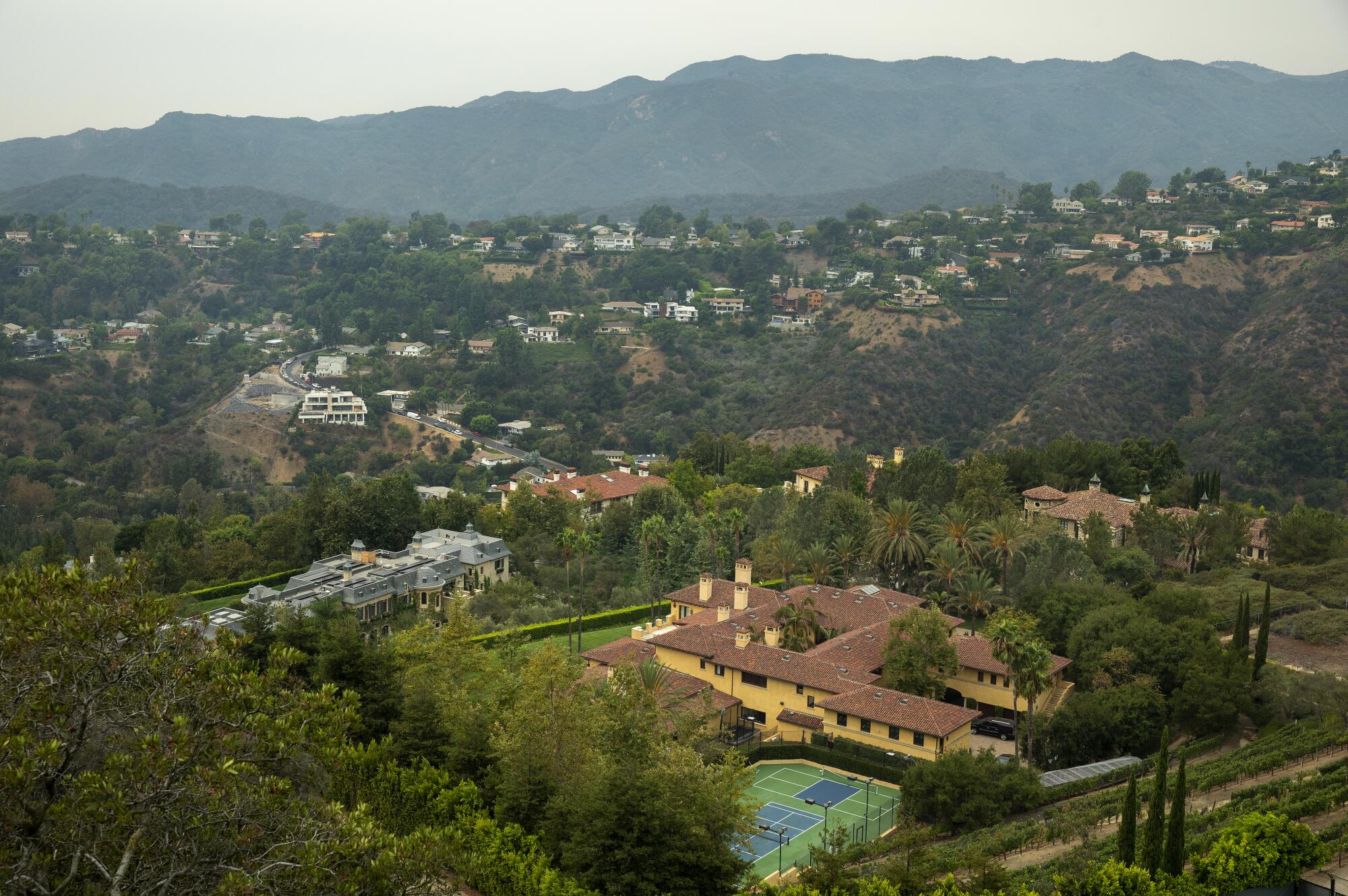
Tourists made pilgrimages to the home on Bundy and the former NFL star’s mansion on Rockingham Lane even after it was demolished. By the early 2000s, locals say, celebrities started buying homes in the seemingly untapped real estate hot spot.
Santiago Arana said his L.A.-based firm, the Agency, has in recent years sold homes for as much as $36 million to buyers who see in Brentwood the possibility of enjoying what earlier residents cherished — privacy, clean wilderness air and a feeling of living off the beaten path.
But there’s a nonmonetary price to pay for living in Brentwood. Smoke from this summer’s wildfires frequently robbed its homeowners of their fresh air and precious views. The haze was a reminder that wealth, status and seclusion can’t shield residents, even here, from the growing dangers of climate change that make living in California, with all of its glories, so precarious.
An event at the Getty last fall also felt like a foreshadowing of the turmoil to come.
Yes, Randy Newman, from the South Bay to the Valley, from the Westside to the Eastside, everybody loves Los Angeles these days.
The R&B singer Solange and the choreography team of Gerard & Kelly co-presented the free dance performance “Bridge-s” on the center’s terrace, with the fire-scorched hills of Brentwood as an eerie backdrop. The audience was as noteworthy as the view — young people of every complexion dressed in avant-garde fashions, some printed with messages of ethnic pride. It was a bold representation of L.A.’s diversity in a community where even spotting someone who isn’t white is unusual.
Solange’s mother, Tina Knowles-Lawson, stood by her side as a racially mixed dance troupe dressed in autumn orange leaned on one another and built human pyramids topped by horn players. At one point, spectators started to murmur and point their fingers toward a second-level balcony — it was Beyoncé, Solange’s older sister, who lives close by in Bel-Air with Jay-Z and their three children.
The focus quickly shifted back to the dancers. The performance was all about group cohesion and the interconnectedness of individuals in a society, a theme Harris would touch on during her speech at the Democratic National Convention in August. She spoke of her “vision of our nation as a beloved community … a country where we look out for one another, where we rise and fall as one.”
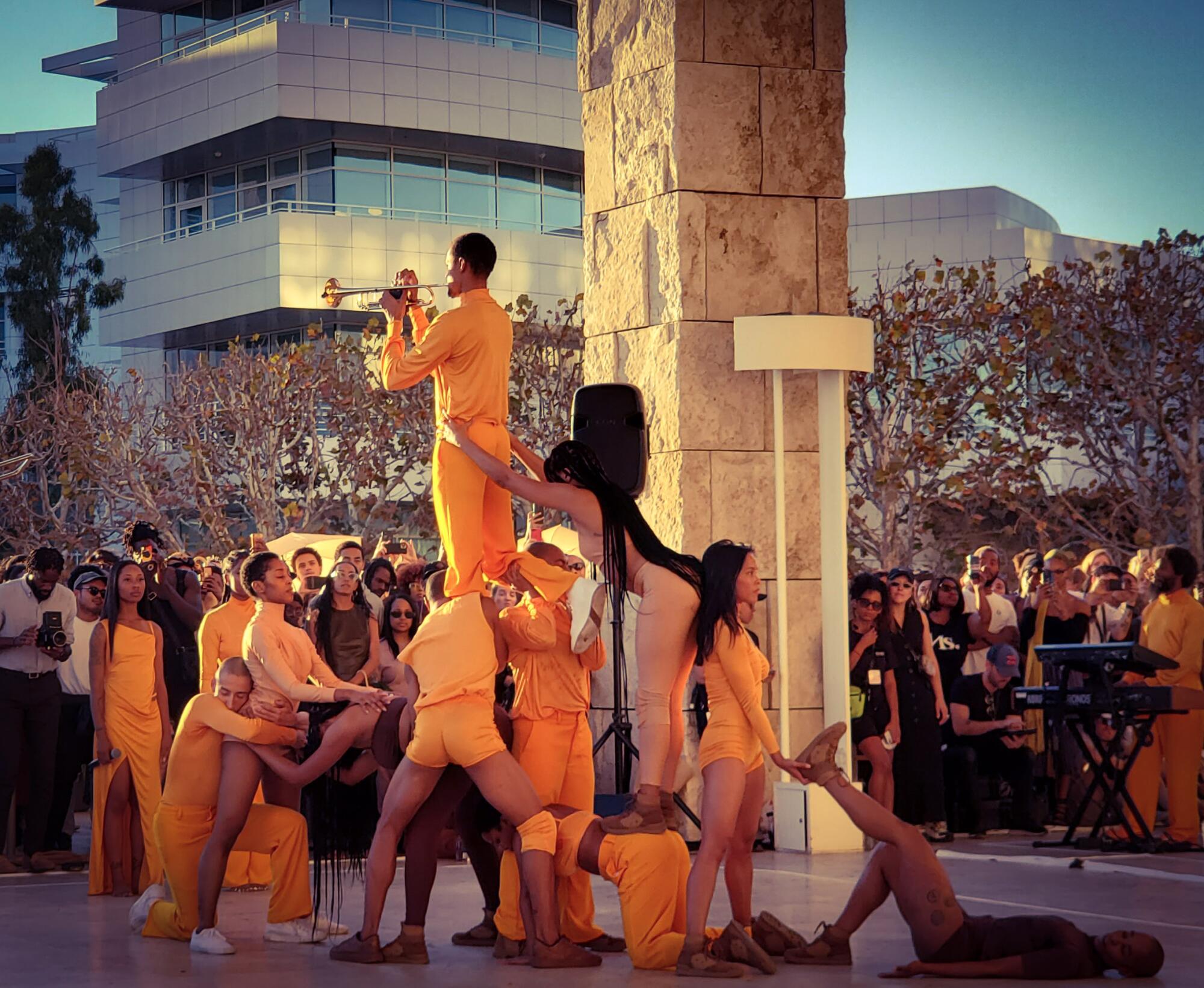
Near the end of the show, the dancers spoke over one another as they recited the same line: “The house that was built could crumble at any time.” They repeated those words again and again, as if they somehow had seen the country’s future and were passing on a warning: Soon, a pandemic, economic uncertainty, social conflict and political division would threaten to unravel the ties that bind the nation’s citizens.
The “house” the dancers were referring to was never explicitly identified.
It could’ve referred to the pricey estates clinging to the blackened hillsides of Harris’ neighborhood in the distance. Or it could’ve referred to America itself.
This is how the 2020 election looks from the towns that are home to or key to understanding Donald Trump, Joe Biden, Kamala Harris and Mike Pence.
More to Read
Get the L.A. Times Politics newsletter
Deeply reported insights into legislation, politics and policy from Sacramento, Washington and beyond. In your inbox three times per week.
You may occasionally receive promotional content from the Los Angeles Times.
